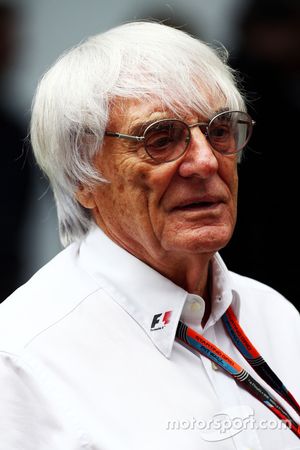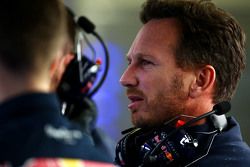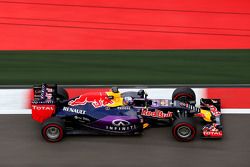Ecclestone still pushing for alternative engine for Red Bull
Bernie Ecclestone is still contemplating an alternative to the current V6 hybrid power unit, and if he succeeds in pushing it through it could mean that the F1 grid will feature two different engine types as early as next season.

Red Bull Content Pool











The two alternatives he has been considering in recent months are a return to pre-2014 V8s - with Renault or Cosworth as the possible sources - or the use of a 3.5-litre twin-turbo V6, with a simple KERS package.
Ecclestone has access to a third party example of the latter.
Any move towards an alternative engine would require significant last-minute rule changes to be forced through, and would obviously come up against considerable opposition from teams.
It is not clear how even Ecclestone could pull off such a coup, especially as FIA president Jean Todt is unlikely to support any move that would suggest that the V6 hybrid rules have failed.
However, the ongoing saga over the current lack of a 2016 power unit supply for both Red Bull Racing and Scuderia Toro Rosso could give Ecclestone the ammunition he requires, in the form of force majeure.
Red Bull is known to be aware that a 3.5-litre V6 is potentially available. In addition, the Lotus and Renault deal is still far from concluded, so a third team could yet require an engine for 2016.
Ecclestone insisted throughout the Russian Grand Prix weekend that Red Bull would find an engine solution, and that there would be 22 cars on the grid next year, despite Ferrari and Mercedes both making it clear that they would not be supplying the Milton Keynes team.
The newly-published sporting regulations also still specify that manufacturers can only supply one spec next year, so there is currently no formal provision for them to be able to provide year-old engines, as was the case with Manor this season.
That's one of the key issues being discussed today at the Geneva meeting of engine manufacturers and the FIA.
Parity key
If Ecclestone is serious about creating room for a different type of engine, then inevitably the biggest problem would be ensuring that there is some form of parity between the current hybrids and any alternative.
However, Ecclestone's end game may be to use the threat of Red Bull having access to a viable alternative powerplant to force Ferrari or Mercedes to agree to supply a current spec hybrid V6 in 2016.
Having spent hundreds of millions on their hybrid programmes, Ferrari boss Sergio Marchionne and Mercedes CEO Dieter Zetsche will not be keen to compete against a low-tech, low-budget alternative.
There is also a wider political picture, in that Ecclestone is keen to wrest back some power from the manufacturers by giving teams an alternative – and also ensuring that there are 'independent' teams on the grid who are not forced to vote for what Ferrari or Mercedes want due to their hands being tied by their supply deals.
Red Bull has of course traditionally been Bernie's biggest supporter in all FIA matters.
Ecclestone made his thoughts on that subject clear in an interview with Sky's Martin Brundle at Sochi.
"If you had a team and Mercedes supplying you with engines, and they wanted a vote on something, you'd have to put your hand up and vote for whatever you wanted," he said.
"Otherwise you're maybe not going to get the engine that you want. We need a good... We need another Cosworth. That's basically what we want. You and I can start a team, and then we can go and get an engine. Today we don't know."
Done before
The idea of an alternative engine emerged earlier this year, and Ecclestone has insisted that it would not be the first time that F1 had two types of engine running concurrently, telling Motorsport.com: "We used to run turbos with normally aspirated engines before. You can do either."
"It's an interesting concept," Red Bull boss Christian Horner told Motorsport.com in April. "We ought to have a good look at it and explore the pros and cons, to be honest with you.
"It's happened before, and you might get certain engines competitive at different tracks, and it might move things around a bit. It's certainly worth a good debate. It's certainly interesting."
Regarding the problem of ensuring parity, Horner added: "There are all kinds of permutations that clever engineers can come up with, but first of all let's have a look at the concept.
"These days simulation is very accurate, we can simulate what the outcome could be, and then decisions could be made on an informed basis rather than guessing."
Be part of Motorsport community
Join the conversationShare Or Save This Story
Subscribe and access Motorsport.com with your ad-blocker.
From Formula 1 to MotoGP we report straight from the paddock because we love our sport, just like you. In order to keep delivering our expert journalism, our website uses advertising. Still, we want to give you the opportunity to enjoy an ad-free and tracker-free website and to continue using your adblocker.



















Top Comments